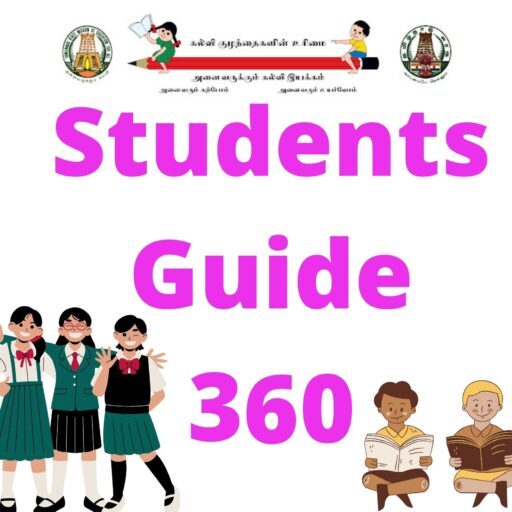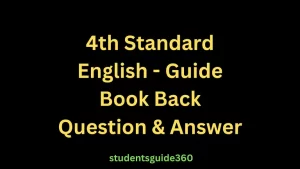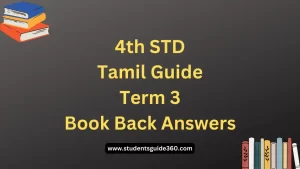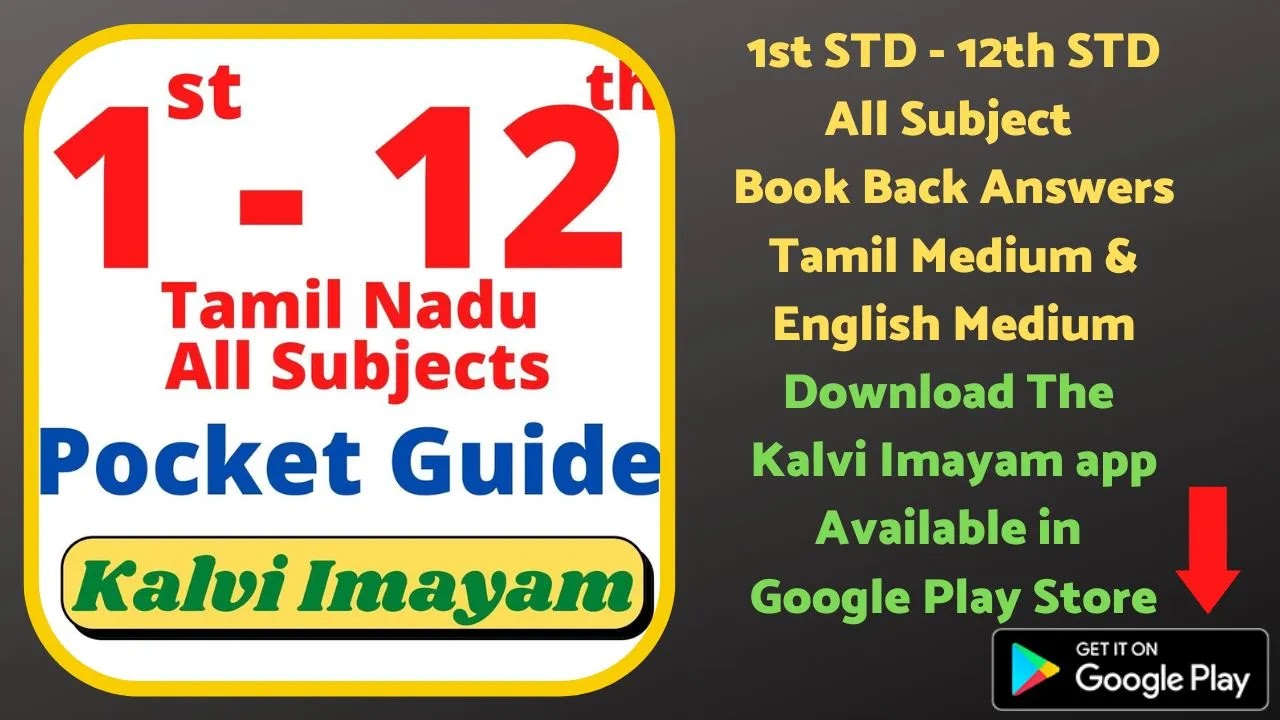4th Science Guide Term 1 Lesson 2 Matter and Materials
Kalvi 4th Science Solutions Term 1 Chapter 2 Matter and Materials
4th Standard Science Term 1 Lesson 2 Matter and Materials Book Back Question and Answers Download PDf. 4th Science Term 1 English Medium Book in answers. 4th All Subject Book Back Answers.
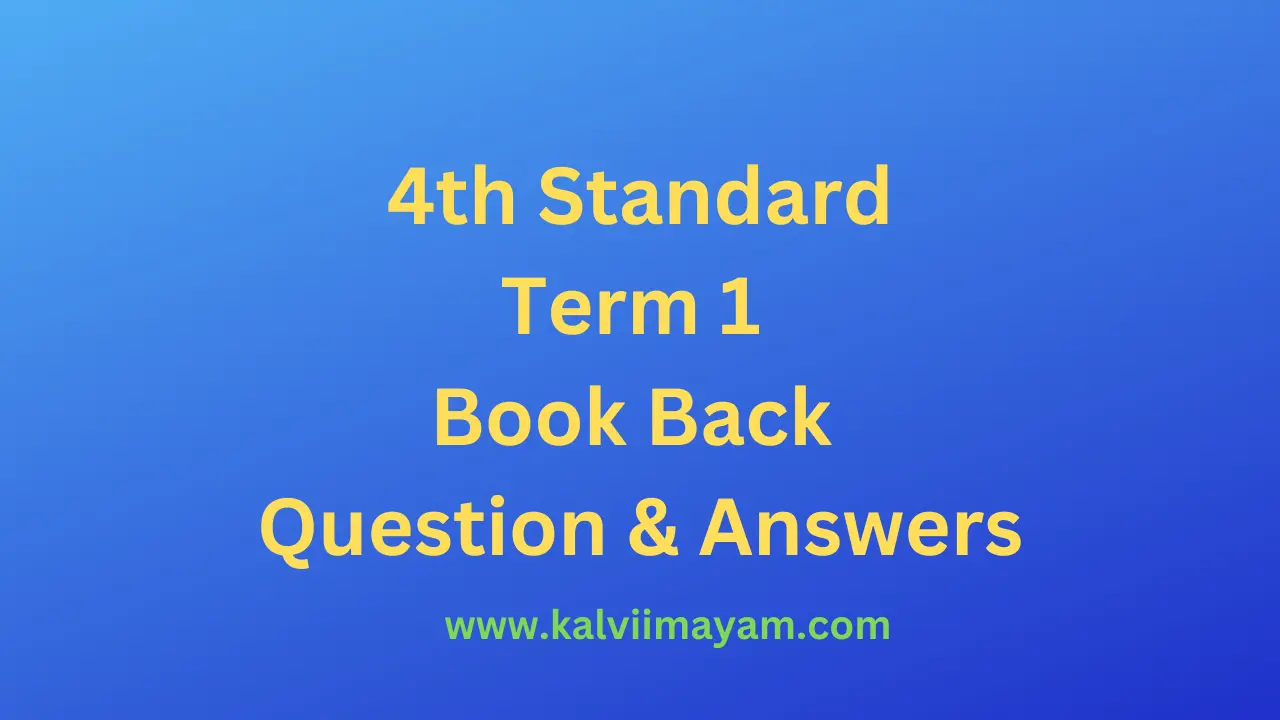
4th Science Guide Matter and Materials Text Book Back Questions and Answers
Samacheer Kalvi 4th Science Guide Matter and Materials Text Book Back Questions and Answers
4th Science Guide Term 1 Chapter 2 Matter and Materials
I. Pick out the odd one :
Question 1.
brick, coir, silk cloth, pine apple
Answer:Silk cloth
Question 2.
stone, rubber band, cycle tube, electric wire
Answer:Stone
Question 3.
sun, candle, torch, pen
Answer:Pen
Question 4.
umbrella, sponge, rain coat, jerkin
Answer:Sponge
Question 5.
glass bottle, exam pad, paper plate, wooden board
Answer:Glass bottle
II. Fill in the Blanks :
Question 1.
Materials which can be compressed or cut easily are called __________.Answer:Soft materials
Question 2.
Gold and diamond are the examples of ___________ materials.Answer:Shiny
Question 3.
Materials which can be bent or stretched easily are called ___________.Answer:Flexible
Question 4.
__________ objects allow all the light to pass through them.Answer:Transparent
Question 5.
___________ is the natural source that stimulates sight and makes thingsAnswer:Light
III. Match the following: (Text Book Page No. 101)
Question 1.

Answer:

IV. Say True or False :
Question 1.
We cannot compress, cut or bend the rough materials easily.
Answer:False
Question 2.
Dull materials reflect light.
Answer:False
Question 3.
Sand paper is a good example for smooth materials.
Answer:False
Question 4.
Opaque objects do not allow light to pass through them.
Answer:True
Question 5.
Mirrors change the direction of light that fall on them.
Answer:True
V. Answer the following questions :
1. When can you say a material is waterproof material?
Answer:
- Materials that do not allow water to pass through them are called water proof material.
- Example: raincoat, aluminium foil of tablet strip.
2. What is a light source?
Answer:
- The objects that give off light are called light source.
- Example: Sun or sources like an electric lamp or a bulb
3. What is the difference between transparent and opaque materials?
Answer:
|
Transparent materials |
Opaque materials |
|
1. Transparent objects allow the lights to pass through them. |
Opaque objects do not allow light to pass through them. |
|
2. We can see other objects clearly through transparent objects. |
We cannot see through opaque objects. |
|
3. Example: air, glass, pure water. |
Example: wood, stone and metals. |
4. Define reflection.
Answer:
- The bouncing of light by any smooth or polished surface is called
5. Classify the objects given below as transparent, translucent or opaque materials.
- Transparent materials Translucent materials Opaque materials
Answer:
(Air, Rock, Water, Aluminium foil, Mirror, Snow, Wooden board, Polythene bag, CD, Oil soaked paper, Glass tumbler and Coloured glass)
|
Transparent materials |
Translucent materials |
Opaque materials |
|
Air |
Polythene bag Oil |
Rock |
|
Water |
soaked paper |
Aluminium foil |
|
Mirror |
– |
Snow |
|
Glass tumbler |
Coloured glass |
Wooden board, CD |
Samacheer Kalvi 4th Science Guide Matter and Materials Intext Questions and Answers
Try to Answer :(Text Book Page No. 95)
Question 1.
Look at the pictures and identify the materials by which they are made of :
(paper, clay, glass, wood, plastic, metal rubber, wax)

Try to Answer :(Text Book Page No. 96)
Question 1.
Match the objects that are made of same material

Answer:
- 1 (b) 3 (c) 2
- 2 (b) 1 (c) 3
- 3 (b) 2 (c) 1
Try to Answer :(Text Book Page No. 96)
Write whether the given materials are hard or soft.
Question 1.

Try to Answer :(Text Book Page No. 97)
Sort the given objects as rough or smooth.
Question 1.

Try to Answer :(Text Book Page No. 97)
Text the flexibility.
Give one plastic scale and wooden scale to the students. Ask them to bend. Tabulate their observation (bends, does not
bend).
Question 1.

Try to Answer :(Text Book Page No. 99)
Write whether the objects are transparent, translucent or opaque.
Question 1.

I. pick out the odd one :
Question 1.
Rope, Salt paper, Mirror Ball, Wood
Answer:Mirror Ball
Question 2.
glass, raincoat, aluminum foil, tablet strip
Answer:Glass
Question 3.
candle, mirror, silk cloth, tiles
Answer:Candle
Question 4.
stainless steel, foam, gold, diamond
Answer:Foam
II. Say True or False :
Question 1.
A block of wood is opaque.
Answer:True
Question 2.
A clear window is opaque.
Answer:False
Question 3.
Soft materials can be early compressed.
Answer:True
Question 4.
Smooth materials do not have ups and downs
Answer:True
III. Match the following :
Question 1.
- Vegetable oil – (a) Transparent
- Glass – (b) Transparent
- Wood – (c) Waterproof
- Aluminum foil – (d) Opaque
Answer:
- b
- a
- d
- c
IV.Choose the correct answer :
Question 1.
Soft material
(a) Rope
(b) Soap
(c) Salt paper
(d) Stone
Answer:(b) Soap
Question 2.
Which material is transparent?
(a) Glass
(b) White plastic
(c) Coir
(d) Snow
Answer:(a) Glass
Question 3.
An object that blocks all of the light from passing through is
(a) Transparent
(b) Clear
(c) Opaque
(d) Translucent
Answer:(c) Opaque
Question 4.
Which among the following is an example of dull material?
(a) Stainless steel
(b) Gold
(c) Candle
(d) Diamond
Answer:(c) Candle
Question 5.
Materials which have ups and and downs on their surface are called .
(a) Smooth material
(b) Rough material
(c) Shiny material
(d) Hard material
Answer:(b) Rough material
Question 6.
Rubber band is an example of
(a) Rough material
(b) Flexible material
(c) Rigid material
(d) Smooth material
Answer:(b) Flexible material
V. Fill in the blanks :
Question 1.
__________ through which light can pass partially.Answer:Translucent
Question 2.
___________ through which light can pass completely.
Answer:Transparent
Question 3.
____________ through which light cannot pass.Answer:Opaque
Question 4.
Materials which reflect the light well are called ____________Answer:Shiny material
VI. Answer the following questions in one or two sentences :
Question 1.
Name some examples for shiny materials?
Answer:
Materials which reflect the light well are called shiny materials.
Example: Stainless steel, gold and diamond.
Question 2.
What is material?
Answer:
The matter from which a thing is made of is called Material.
For example: Chair is made of wood, Eraser is made of rubber, Candle is made of wax.
Question 3.
Differentiate hard and soft materials.
Answer:
|
Hard materials |
Soft materials |
|
1. Materials which cannot be easily compressed, cut, bent or scratched are called hard materials. |
Materials which can be easily compressed, cut, bent or scratched are called soft materials. |
|
2. Example: Brick, bone and steel. |
Example: Foam, clay and skin. |
Question 4.
What happens when light hits a transparent object?
Answer:
- Transparent objects allow the light to pass through them.
- So, we can see other objects clearly through Transparent Objects.
- Examples: Air, glass and pure water.
Question 5.
What is Translucent objects? Give an example.
Answer:
- Translucent objects allow some light to pass through them. So, we cannot see objects clearly, but we see them as blurred images through them.
- Examples: Paper soaked in oil, snow and vegetable oil.
Question 6.
What is light sources?
Answer:
- Light may come either from the Sun or from other sources like an electric lamp or a bulb.
- The objects that give off light are called light sources.
